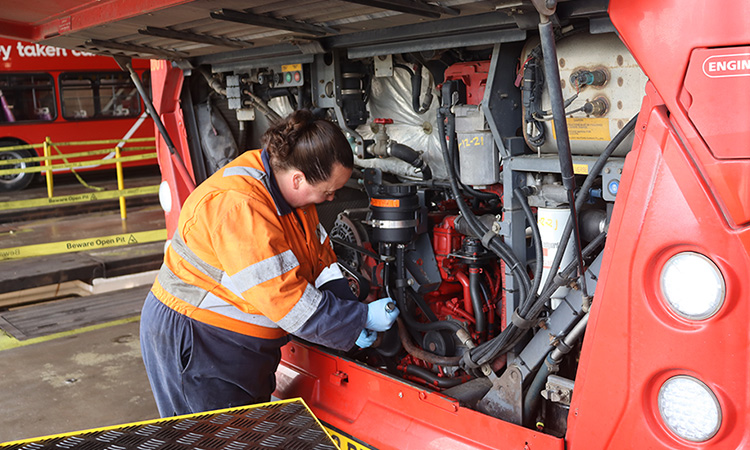Embracing neurodiversity on West Country buses
- Like
- Digg
- Del
- Tumblr
- VKontakte
- Buffer
- Love This
- Odnoklassniki
- Meneame
- Blogger
- Amazon
- Yahoo Mail
- Gmail
- AOL
- Newsvine
- HackerNews
- Evernote
- MySpace
- Mail.ru
- Viadeo
- Line
- Comments
- Yummly
- SMS
- Viber
- Telegram
- Subscribe
- Skype
- Facebook Messenger
- Kakao
- LiveJournal
- Yammer
- Edgar
- Fintel
- Mix
- Instapaper
- Copy Link
Posted: 15 June 2023 | Carolyn Giles - Go South West | No comments yet
Carolyn Giles, Head of People & Operations at Go South West (part of The Go-Ahead Group), provides exclusive insight into the steps that the operator is taking to support its colleagues with neurodiverse characteristics – including through its internal forum, ‘Go Well’. By opening up the conversation, Go South West hopes to create an environment where all colleagues can fulfil their potential and serve their communities.


Over the last decade, Go South West has expanded from a bus network in Plymouth to a regional transport operator stretching across a large chunk of South West England. Go South West began as Plymouth Citybus, a bus operator in and around Devon’s biggest city. We expanded into East Cornwall in 2014, then took on a large contract in 2020 stretching across the county, as far as England’s South Western tip, Land’s End. We expanded again in 2022 by buying Dartline, a bus operator in Exeter. Growth has brought greater diversity to our 900-strong workforce.
As we’ve brought more people on-board, we’ve become aware that we have colleagues with many neurodiverse characteristics”
We want to create an environment where all of our colleagues can fulfil their potential. And, as we’ve brought more people on-board, we’ve become aware that we have colleagues with many neurodiverse characteristics.
Perhaps it’s worth explaining the term ‘neurodiversity’, which isn’t always well understood. It simply means that people experience the world, and interact with it, in different ways, and that there is no one ‘right’ way of thinking, learning or behaving.
An example of neurodiversity is dyslexia, which affects about a tenth of the population. Dyslexia affects skills such as reading, spelling and writing. Another example is Attention Deficit Hyperactivity Disorder (ADHD), which has an impact on peoples’ concentration.
Identifying key challenges
Once people recognised that we were open to the conversation, they felt more able to engage in the conversation and identify what would make their working life easier”
We communicated with our team about these issues through an internal forum called ‘Go Well’. In order to discover how we could better support our colleagues, we set up a project group focusing on practical steps to make working life easier – for everyone across Go South West, whether people work as bus drivers, engineers, in customer service or in any other part of the company.
Initially, many people didn’t feel comfortable talking about neurodiversity. But it was striking that, once people recognised that we were open to the conversation, they felt more able to engage in the conversation and identify what would make their working life easier.
A wide variety of colleagues wanted support. We heard from transport managers who wanted a dyslexia assessment to help them to complete their Certificate of Professional Competence exams, which we were happy to facilitate.
Providing simple, targeted solutions
We also learnt a lot as a business. For example, people with dyslexia sometimes struggle to read black text on white paper – and this made it difficult for some of our bus drivers to see their duty cards. A very simple step that we took to address this was to provide a coloured overlay, which now allows them to read more comfortably.
In addition, among desk-based colleagues and supervisors, we found that some find it a challenge to manage diaries and to prioritise tasks. We’ve found that the use of ‘to do’ note pads, for those who prefer paper, or Microsoft Office packages to schedule work and set reminders, has been an advantage.
We’ve also looked carefully at what organisational tools work best for individuals. Some people find it difficult to take notes during meetings, which packages such as Planner have helped with by allowing them to manage actions straight into their laptops.
The length of meetings, too, can be an issue for some neurodiverse people who find concentration or detail difficult. So we’ve made it clear that we’re very happy for team meetings to be recorded, so that people can watch them back in their own time. Furthermore, we’re making communication as easy as possible – using voice texts and voice activated note taking on mobile phones.


Credit: Go-Ahead Group
Helping right from the start
We support anyone who needs assistance with completing forms, from application forms for jobs to incident reporting forms. In terms of recruitment, we accept video CVs and create as many of our forms in Microsoft 365 as possible, so that they easily guide the user and have automatic spell check.
In a tight labour market, in which attracting and retaining talent is a challenge, it is vital for any good employer to make it as easy as possible for people to show their potential”
Particularly in a tight labour market, in which attracting and retaining talent is a challenge, it is vital for any good employer to make it as easy as possible for people to show their potential. And it has been a worthwhile investment to broaden the communication technology that we use.
We are creating digital champions and accessing functional training – including digital skills – to provide in-house access to learning in order to make it easier to use the available technology. All of our initiatives were wrapped up in a ‘toolkit’ to make colleagues feel as included as possible.
Joe Savage, a Go South West bus driver, said: “As someone who has been diagnosed as Dyslexic, and who understands the struggles that it can entail, I was keen to get involved in this project. The toolkit has been designed with our Dyslexic colleagues in mind, but it is important to understand the resources that are available for all of our colleagues. Simple adjustments can make a big difference to our workforce.”
Opening up the conversation
Some of our colleagues were previously afraid to let us know that they were struggling, causing unnecessary stress. Now, the conversation happens naturally at work. They can ask for support and maintain roles, such as a mentor, without feeling overwhelmed by documentation. Often, team members have fantastic practical skills but feel prevented from accelerating their career due to a fear of written requirements.
By opening up the conversation, we have found that a number of our managers and senior team members are willing to share their experiences of neurodiversity and demonstrate that it has not held back their career. We welcome conversations and suggestions of ways that we can support anyone with their requirements, and the ‘Go Well’ forum checks progress through its quarterly meetings.
Serving communities by supporting our workforce
I firmly believe that a neurodiverse workforce enhances our business, and brings a wider range of skills and characteristics to the table”
Our company is part of The Go-Ahead Group, an international transport operator, and it has been heartening to see that some of the ideas on neurodiversity pioneered here at Go South West are being picked up and adopted by Go-Ahead’s other bus and rail companies. We were pleased, too, that the Dyslexia Foundation praised our initiatives.
Diversity and inclusion, as an employer, takes many forms. It’s not just about visible characteristics. In order to create a workforce where everybody can thrive, you sometimes need to dig beneath the surface and understand the different ways in which people think and communicate.
Our purpose, as a bus operator, is to serve our local communities – and it’s vital that our workforce reflects those communities. I firmly believe that a neurodiverse workforce enhances our business, and brings a wider range of skills and characteristics to the table.


Related topics
Public Transport, Staff & Skills Development, Workforce Inclusivity, Workplace
Issue
Issue 1 2023
Related modes
bus
Related cities
Plymouth
Related countries
United Kingdom
Related organisations
Go South West, Go-Ahead Group
Related people
Carolyn Giles







